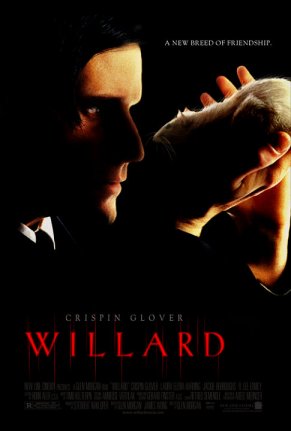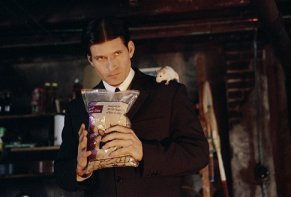|
Willard
Some people
fear rats. Others think they're cute. And occasionally, some
people turn to rats as substitutes for human companionship
because life has beaten them down to the point that they can
barely function in society.
Such
is the case with Willard, a slightly creepy character
study masquerading as a horror film. You might say this is
the way they used to make 'em, quite literally, as this movie
serves to update a 1971 original. While it keeps the spirit
intact, Willard mostly goes to show there really wasn't
much there in the first place.
Willard
Stiles (Crispin Glover) slowly suffocates in his world. Even
before we see him, we hear the airless cry of his dessicated
mother (Jackie Burroughs), nagging him that there are rats
in the basement. Both the mother and the house they live in
might as well be dead, for both have the look of faded parchment.
But Willard doesn't have the strength to tear through.
His days
don't go much better, as he works for the man who bought out
his father's company and quite possibly drove Willard's father
to suicide. Frank Martin (R. Lee Ermey) proves as much a nightmare
as Willard's mother; both characters have a slight sense of
rotting meat about them.
But then,
rats like meat, don't they?
For indeed,
the basement has been invaded by them. After setting traps,
Willard suffers a fit of remorse and rescues his first capture,
a white rat that he names Socrates. Soon their friendship
blossoms into commanding an army of rats. Socrates passes
Willard's orders on to the troops, and only one, a gargantuan
black rat Willard dubs Big Ben, has problems with the hierarchy.
Of course,
when you have an army of trained rats, you really have to
do something with them. In due time, Willard's thoughts turn
to revenge, but perhaps not swiftly enough for most audiences.
Despite
the exploitative thrill of the rats, and the CGI that allows
them to swarm with great skill, Willard really doesn't
seem all that interested in them. It's about Glover and his
quirks, which are fascinating, but not the stuff of big box
office.
And Glover
gives his all in the role of a lifetime. (Not that he hasn't
had them before -- River's Edge and Back To The
Future, of course, have showcased his unique talents very
well.) Wisely, he pulls back on being particularly freaky.
In an ironic move, he plays Willard almost like a normal person.
When he finally lets out some of his anguish, it goes over
the top, but in a real way. (Glover is not afraid to show
his snot on camera.)
It's
an uphill battle for the screen persona that Glover has. As
a result, we never quite feel the sympathy for him that we
might (and did for Bruce Davison in the original), because
we keep waiting for him to snap, and not in a healthy way.
All the
actors, in fact, though good, are cast in a shortcut way.
Rather than being allowed to craft performances, who
they are and what they look like is supposed to tell the whole
story. Unfortunately, this leaves an actress like Laura Haring
out in the cold. As Willard's potential love interest, she
is as drab as most of the scenery - and if you've seen Mulholland
Drive, you know that's a crime.
They're
not helped by the self-referential directing by Glen Morgan.
With his partner James Wong, Morgan helped define the hipness
that made The X-Files, and their work always carries
a pop sensibility. Though lighter than usual in Willard,
this trait still overwhelms the movie.
It starts
by including Davison's image as Willard's father. A nice nod
to the original without really dragging the actor in for an
awkward cameo (it's only in a painting and a couple of photographs),
it would have been enough.
Still,
it's tolerable and still smile-inducing that Morgan stages
many scenes in similar tones to the original. He goes so far
as to make Ermey wear the same suit and hairstyle as Ernest
Borgnine did in the first, even though it looks really out
of date.
But as
the rats corner a cat named Scully in Willard's living room,
the cat accidentally turns on the satellite T.V., to the easy
listening audio channel. What's playing? Michael Jackson's
song "Ben," the theme to the original's sequel.
Never
mind that the near destitute and clearly isolated Stiles family
would probably not have a satellite dish. What's meant to
be an ironic wink to the audience ends up taking us right
out of the scene. That song isn't playing on the soundtrack
- it's in the scene. So this is a world where Michael
Jackson still sang about a rat named Ben, as a rat named Ben
leads a cat slaughter.
Many
of the scenes also have the feel of Hitchcock homage. To be
fair, so did the original. It's hard to have small animals
line up with suspenseful menace without calling to mind The
Birds.
**possible
spoiler warning**
However, the tacked-on ending that smacks of trying to satisfy
a test screening audience steals directly from the ending
of Psycho. It doesn't fit. It's desperate, and it's
a shame that a talented guy like Morgan had to lift it so
baldly. Or maybe I'm confusing clever with talented.
**end of possible spoiler**
As a
critic, I hate to harp on the theme of "the original was better."
This re-make does have some charms that will probably elude
the mainstream. But it's true: the original was better
(there. I've said it.), and if you're interested in seeing
Willard, it will be better worth your time to seek
out the video.
What's
It Worth? $4
However,
the video of Crispin Glover singing "Ben" is worth
more -- seriously great fun -- check it out here.
|







